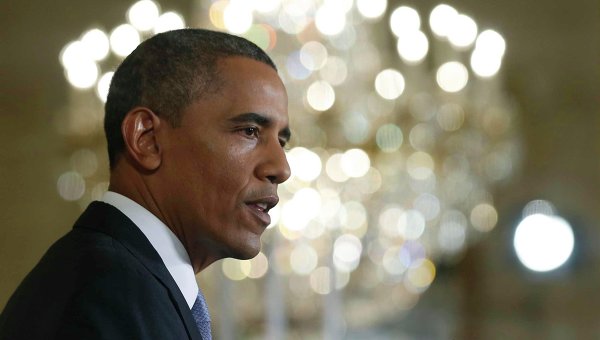
 WASHINGTON, August 9 (RIA Novosti) – President Barack Obama on Friday called for "a pause” in US relations with Russia, even as both countries stressed that cooperation is crucial to their mutual interests and to the world despite sharp differences on a broad range of issues.
WASHINGTON, August 9 (RIA Novosti) – President Barack Obama on Friday called for "a pause” in US relations with Russia, even as both countries stressed that cooperation is crucial to their mutual interests and to the world despite sharp differences on a broad range of issues."It is probably appropriate for us to take a pause, reassess where it is that Russia is going, what our core interests are, and calibrate the relationship so that we’re doing things that are good for the United States and, hopefully, good for Russia as well,” Obama told a White House news conference Friday.
The comments came two days after the White House announced it had canceled Obama’s planned summit next month with Russian President Vladimir Putin, citing lack of prospects for progress in the bilateral agenda as well as Moscow’s harboring of accused US intelligence leaker Edward Snowden.
But they also coincided with talks in Washington between top US and Russian officials that both sides took pains to describe as constructive while largely downplaying discord over issues such as missile defense, the ongoing civil war in Syria and Russia’s decision to grant temporary asylum to Snowden, who is wanted by the United States to face espionage charges at home.
In his most expansive public discussion of frayed US-Russian relations since his reelection last November, Obama told Friday’s news conference that Putin’s return to the Kremlin last year has coincided with "more rhetoric on the Russian side that was anti-American, that played into some of the old stereotypes about the Cold War contest between the United States and Russia.”
"I’ve encouraged Mr. Putin to think forward as opposed to backwards on those issues – with mixed success” in the effort, Obama said.
He added that both countries should recognize "that there are just going to be some differences, and we’re not going to be able to completely disguise them.”
Obama denied that he had poor relations with Putin despite much public parsing of frosty looking images of their one-on-one meetings.
"I don’t have a bad personal relationship with Putin,” Obama said. " … I know the press likes to focus on body language and he’s got that kind of slouch, looking like the bored kid in the back of the classroom. But the truth is, is that when we’re in conversations together, oftentimes it’s very productive.”
Officials from both countries on Friday downplayed the importance of the Snowden impasse in a bilateral agenda that includes US missile defense plans, which Russia sees as a threat to its security, and the violence in Syria, where the Kremlin warns that US military aid to rebel forces risks empowering terrorists and US officials accuse Moscow of propping up Syrian President Bashar Assad.
Obama said his decision to scrap the summit was not based "simply around Mr. Snowden,” but rather on what he described as Russia’s failure to move "on a whole range of issues where we think we can make some progress.”
Russian Foreign Minister Sergei Lavrov, meanwhile, told reporters following meetings with US Secretary of State John Kerry and the two countries’ top defense officials in Washington on Friday that Snowden "did not overshadow our discussions.”
"This was mentioned as a fact which we have on our hands,” Lavrov said of the standoff over Snowden. "But the main discussion was about the issues of the agenda, which are of huge interest to the United States, to the Russian Federation and to the entire world.”
Lavrov insisted that Russia had acted in accordance with its own laws and with international law in granting Snowden asylum last week, a position he said Moscow has consistently communicated to Washington since the fugitive former US intelligence contractor landed in Moscow on a flight from Hong Kong on June 23.
A senior US official told reporters during a conference call after Friday’s meetings that the Snowden affair did not "dominate or overshadow” the talks between Lavrov, Kerry, US Defense Secretary Chuck Hagel and Russian Defense Minister Sergei Shoigu.
"What we were able to agree on was the need to move forward on areas of mutual interest,” the official said, adding that the talks focused on missile defense, arms reduction, political and military cooperation, and regional security, including in Syria, Afghanistan, Iran and North Korea.
Both sides said Friday that they had agreed that a political settlement is the only acceptable resolution to the civil war in Syria and that they remain committed to holding the so-called so Geneva-2 conference aimed at bringing an end to the violence in Syria.
Speaking in Moscow on Friday, Putin’s top foreign policy aide, Yury Ushakov, said Obama’s invitation to meet the Russian president in Moscow remains open and that the Kremlin hopes the American president will accept the offer.
Talks between the two countries at the highest level are "very important … not only for both of our countries, but for guaranteeing global stability and security,” Ushakov said.
Obama said the United States said effective cooperation is possible if Russia "is looking forward into the 21st century” but that a "zero-sum” mindset is counterproductive for bilateral ties.
"If issues are framed as if the US is for it, then Russia should be against it, or we’re going to be finding ways where we can poke each other at every opportunity, then probably we don’t get as much stuff done,” Obama said.



_jpg/250px-ElbeDay1945_(NARA_ww2-121).jpg)





